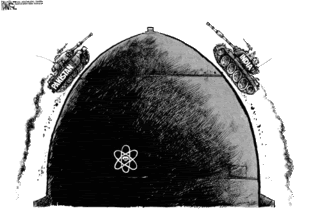
You know: Hair on fire, claxon alarms, shrieks, the clattering of hundreds of shoes as diplomats rush to planes to talk these two countries down?
Pakistan Moves Thousands Of Troops Toward Indian BorderBecause... you know... both countries have nukes? Hello Bush administration? The article continues:
The troops headed to the Indian border were being diverted away from tribal areas near Afghanistan, officials said, and the move was expected to frustrate the United States, which has been pushing Pakistan to step up its fight against al-Qaida and Taliban militants near the Afghan border.Wait ... surely Bush must be on it!
Two intelligence officials said the army's 14th Division was being redeployed to the towns of Kasur and Sialkot, close to the Indian border. They said some 20,000 troops were on the move. Earlier Friday, a security official said all troop leave had been canceled.
The officials spoke on condition of anonymity because of the sensitivity of the situation.
Both countries have said they want to avoid military conflict over the attacks. But India has not ruled out the use of force as it presses its neighbor to crack down on the Pakistani-based terrorist group it blames for the attack.
The United States has urged India and Pakistan to avoid unnecessarily raising tension amid reports of troop movements to the border.What? This standoff could start WWIII (or is it IV?). Do we have anyone going over there? Like... you know... Rice? Anybody? Did Bush fire the entire diplomatic corps? And what does it mean: the US is in close contact? What does that mean? On the phone? IMing? Email? Why do I think nobody's home .....?
[snip]Air strikes against militants in the restive Swat and Bajaur regions had been scaled down as some of the airpower had to be redeployed to the country's eastern border, a senior Pakistani military official told Asif Farooqi, the Islamabad-based correspondent of the BBC Urdu service.
There have been reports of possible forthcoming "surgical" strikes by India on the headquarters and camps of Lashkar-e-Taiba, the militant group India blames for the Mumbai attacks.
The group and Pakistan's government deny any involvement.
White House spokesman Gordon Johndroe said: "We hope that both sides will avoid taking steps that will unnecessarily raise tensions during these already tense times."
He said the US remained "in close contact with both countries to urge closer co-operation in investigating the Mumbai attacks and in fighting terrorism generally".
The BBC's Barbara Plett in Islamabad says the troop movements do not appear to be greatly significant and that both countries have said they want to avoid military conflict. However they warn they will act if provoked.
But our correspondent says any significant cut in the Pakistani military presence along the Afghan border would worry Washington, which relies on Islamabad to stem cross-border Taleban attacks on Nato forces.
President-elect Obama?
OoOoohhhhhhHHh boy.... January 20th can't come fast enough...Dec. 12, 2008 | A consensus is emerging among intelligence analysts and pundits that Pakistan may be President-elect Barack Obama's greatest policy challenge. A base for terrorist groups, the country has a fragile new civilian government and a long history of military coups. The dramatic attack on Mumbai by members of the Pakistan-based Lashkar-e Tayiba, the continued Taliban insurgency on the Pakistan-Afghanistan border, the frailty of the new civilian government, and the country's status as a nuclear-armed state have all put Islamabad on the incoming administration's front burner.
But does Obama understand what he's getting into? In his "Meet the Press" interview with Tom Brokaw on Sunday, Obama said, "We need a strategic partnership with all the parties in the region -- Pakistan and India and the Afghan government -- to stamp out the kind of militant, violent, terrorist extremists that have set up base camps and that are operating in ways that threaten the security of everybody in the international community." Obama's scenario assumes that the Pakistani government is a single, undifferentiated thing, and that all parts of the government would be willing to "stamp out" terrorists. Both of those assumptions are incorrect.
Pakistan's government has a profound internal division between the military and the civilian, which have alternated in power since the country was born from the partition of British India in 1947. It is this military insubordination that creates most of the country's serious political problems. Washington worries too much about other things in Pakistan and too little about the sheer power of the military. United States analysts often express fears about an internal fundamentalist challenge to the chiefs of staff. The main issue, however, is not that Pakistan's military is too weak, but that it is too strong. And that is complicated by the fact that elements within the military are at odds, not just with the civilian government, but also with each other.
[snip]
The United States, going back to the Cold War, has long viewed the Pakistani army as a geopolitical ally, and Washington tends to prefer that the military be in power. Since Gen. Musharraf was forced out, U.S. intelligence circles have been lamenting the country's "instability," as though it were less unstable under an unpopular dictatorship. If Pakistan -- and Pakistani-American relations -- are to have a chance, it will lie in the incoming Obama administration doing everything it can to strengthen the civilian political establishment and ensure that the military remains permanently in its barracks. The military needs to be excluded from political power, and it needs to learn to take orders from a civilian president. At the same time, Obama should follow through on his commitment to commit serious diplomatic resources to helping resolve the long-festering Kashmir issue.
No comments:
Post a Comment